How to make easy manure tea in 2 ways recipe that is great when we are farming or gardening, we have to make sure the soil is fertile. Watering the plants is not enough because I still need some sort of fertilizer. However, if you do not want to waste money to buy fertilizer, then you can try manure or organic fertilizer yourself.
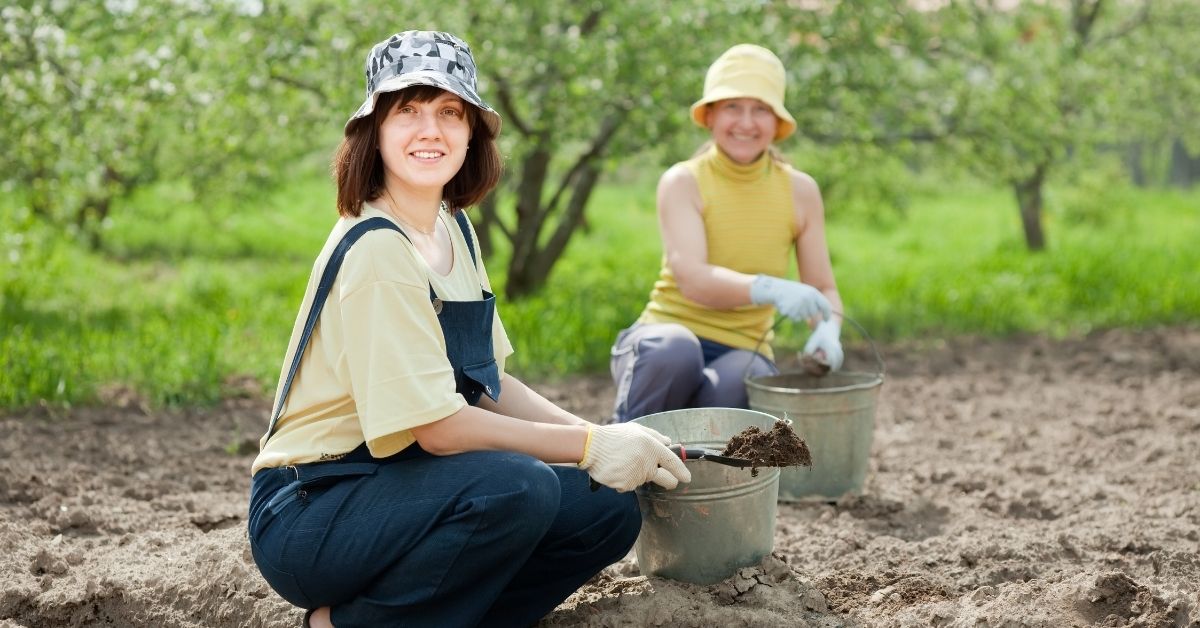
If you just want to make the manure liquid, then you can try to make manure tea fertilizer. This is a good DIY organic fertilizer for a low-budget gardener. I know my farmer raises organic grass-fed cows so need to worry if the cows are medicated. The grass-fed manure is the best if that’s possible to say. It sure is different than cows fed with corn and grains.
Be mindful, manure has bacteria and therefore I never ever spray it on my plants, especially cabbage, lettuce, or leaf plants. But I have read where a lot of gardeners do spray their vegetable plants with manure tea and show a huge decrease in plant diseases.
Table of Contents or Collapse to Hide
What Type of Manure Should You Use?
Before we make manure tea fertilizer, it is important to know the type of manure that you can use. Well, you can use any manure from some animals such as goat, cow, poultry, horse, rabbit, and chicken. Be mindful of which animal manure carry high nitrogen as in chickens manure before using.
Every farm animal has good manure for soil fertility, especially herbivores. You should not use carnivore manures like dogs or cats because they contain dangerous pathogens that can cause diseases to the homeowners.
Cow Manure is the Best Fertilizer
For my garden, cow manure is one of the best materials for making manure tea fertilizer. Cows produce so much manure every day that you can make manure tea on a large scale.
Cow manure can make fertile soil so that your plants will be fertile and develop well. Using fresh manure is not recommended as it most likely will burn your plants. Using dried, the longer the better is best.
Besides that, cow manure is also cheap and you can get it for free from most local farmers. So, how to make manure tea fertilizer from a cow? Making manure tea fertilizer from a cow is very easy. You can try the following two ways to make manure tea.
Manure Tea Video Tutorial
Traditional Manure Tea Recipe
One traditional way of making manure tea is made the old fashion way using dried cow manure-non-medicated manure by throwing everything in a container. This is the conventional way that is quite easy to do.
First of all, I prepare a bucket or big container for five gallons of water. Then, I put some water in the container accordingly.
Next, I put cow manure in the bucket. Then I stir the manure in the bucket using a long stick once a day. Then, I leave it for a few hours until the manure settles to the bottom. Once the manure goes down to the bottom, then I just pour the manure tea liquid into other containers.
Finally, the manure tea fertilizer is ready to use. You may need to dilute the tea before using it for tender plants.
How to Apply Fertilizer on New Plants
For very new plants, I will always dilute the newly made fertilizer with usually half water and half tea so as not to burn or over-fertilize the new plants.
Manure Tea Bags
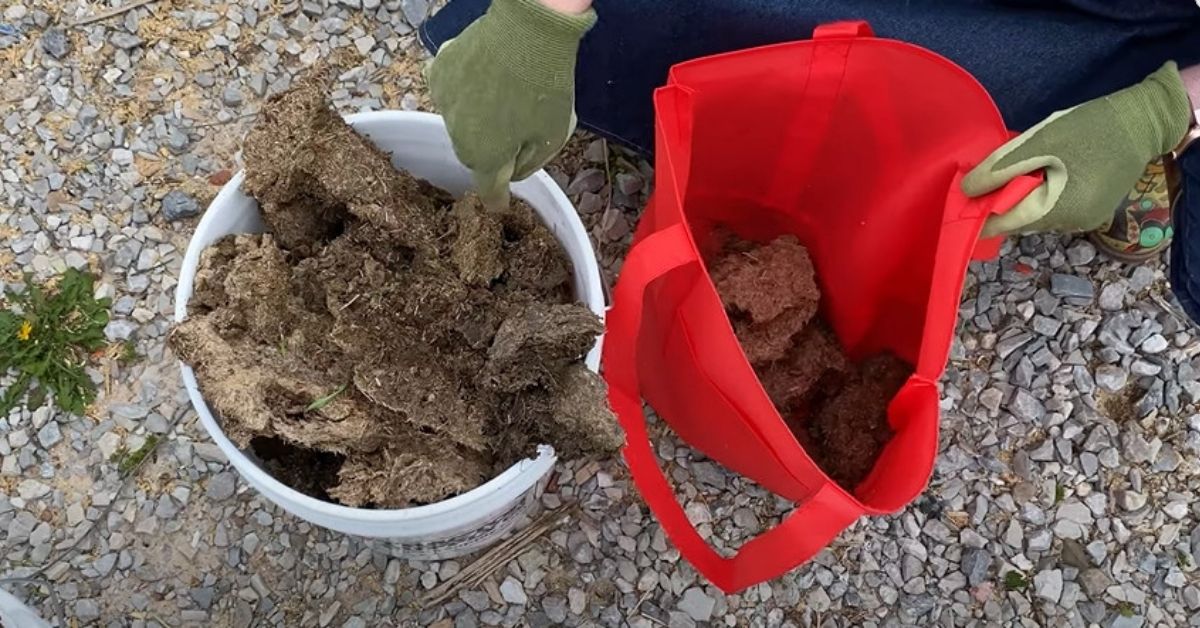
Suppose you do not want to mix the manure with the water directly, then you can try to make a manure tea bag. This is a good way so you do not have to wait for the manure tea liquid for a long time. You can just make a manure tea bag using a cotton pillowcase.
Put the manure in a burlap sack or old pillowcase, tie closed and use it as a “teabag” in the bucket of water. This way you will not have to deal with floaters. You can compost the burlap or pillowcase afterward.
I do not often use this method because it takes a lot longer to make a stronger tea this way. When available, I like to use a reusable shopping bag from Publix which fabric is like landscape fabric.
Put the manure inside the fabric and then tie it. You can make many manure tea bags according to your wishes. When you want to use the manure tea, you can simply put some manure tea bags in a container and then put in enough water. Once the water changes color, you can remove the manure tea bags. This method requires some time, at least a week or more for the tea to brew and not burn the plants.
Materials Needed for Manure Fertilizer
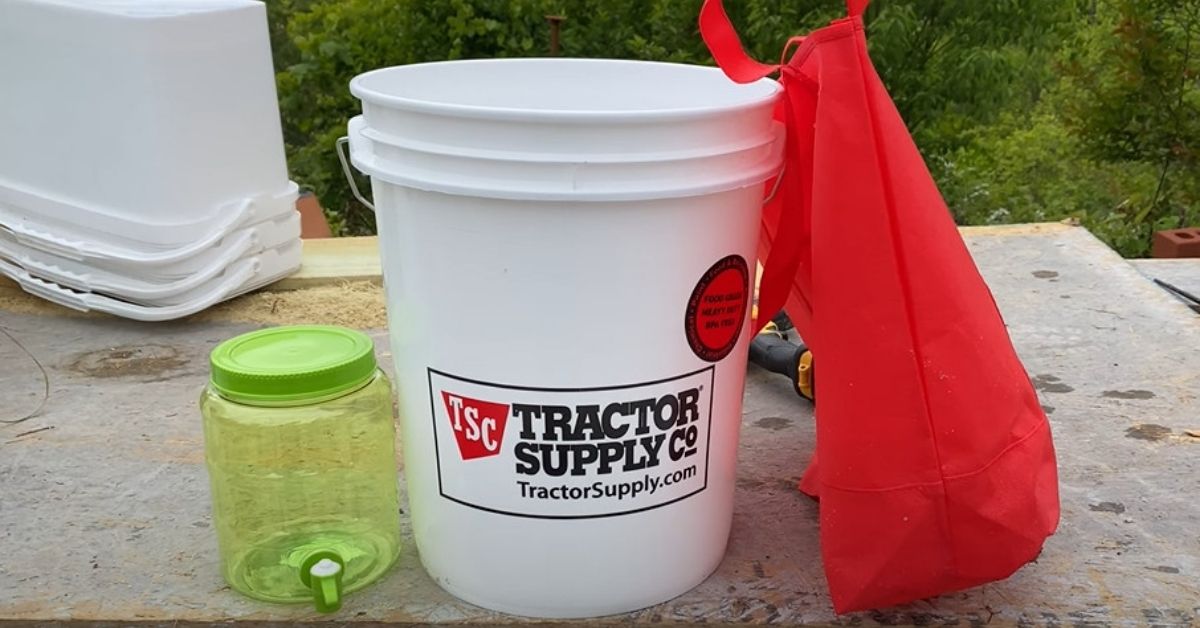
- Food-grade 5 gallon bucket
- Spigot/bung
- Rubber washers
- Liner for tea bags
- Mesh Strainers such as landscape fabric or mesh bags
- Optional: drywall mixing paddles
Two Directions to Make Manure Tea
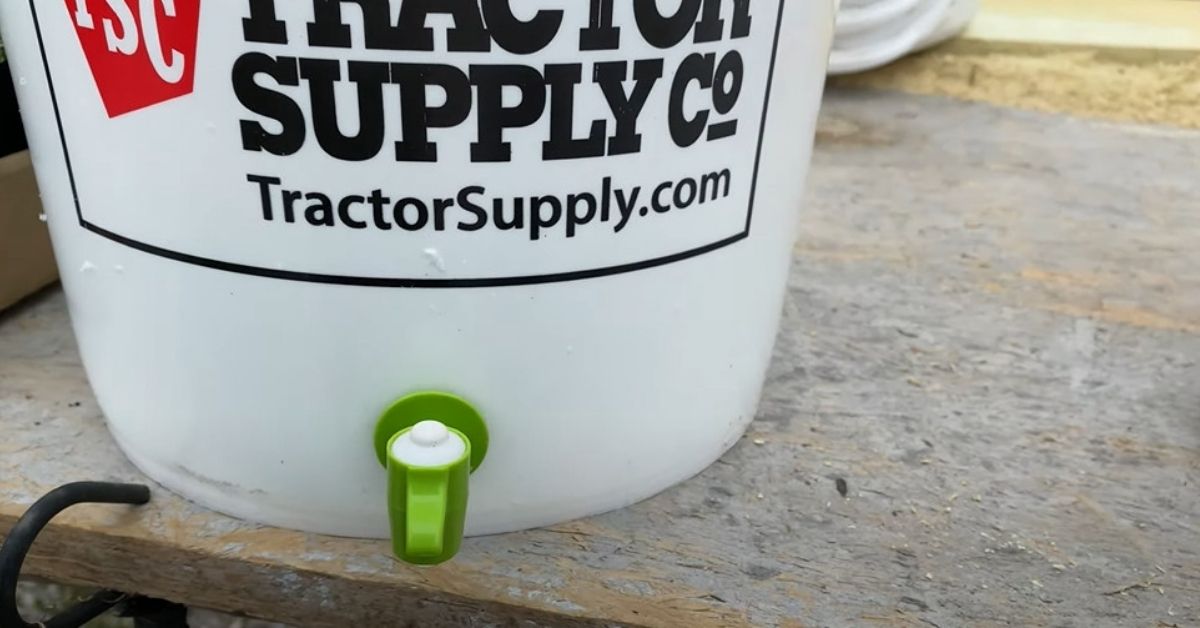
Direction #1
- Drill a hole the size of the spigot
- Add the rubber washers
- Put the spigot in the bucket and tighten
- Do a water test and check for leaks
- Recycle the water in the garden
- Add the landscape mesh bag
- Add the dried cow manure to the bucket
- Fill to the top with water
- Stir well and every day
Direction #2
- Follow the directions above to the water test and recycling the water
- Do not add a mesh bag
- Add the dried manure tea to the bucket
- Stir with the drywall paddle
- This manure tea will be ready to use versus the manure tea that is hand stirred and no paddle used
How Much Manure is Needed to Make Fertilizer?
Some will say use the 1:5 ratio, O1 being one-part manure to 5 parts water. I do not measure, I know shocker. I fill up a few 5-gallon FOOD-GRADE buckets with dried manure, bring it home, and add water to fill the bucket. I stir it once a day. Or better yet, I use a sheetrock mixer. This may be a little over-kill, but it really breaks up those lumps.
How Long Does it Take to Make Manure Tea?
People prefer manure tea fertilizer because it is cheap and easy to get. If you have cows, then you can collect the manure and then make some manure tea for free. So, when we talk about the price of manure tea, it is totally free of charge if you own cows or know someone who does.
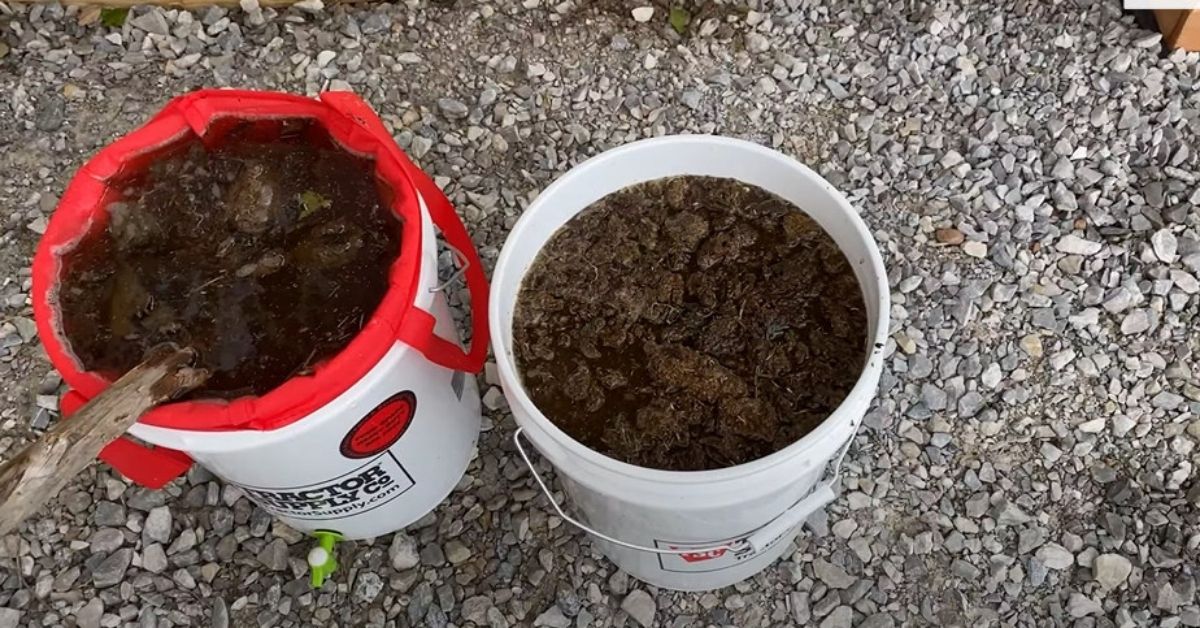
You can even sell manure tea fertilizer to contribute to your income. Also, manure tea fertilizer is much better because it is an organic fertilizer. You can use it for any plants in your garden.
This manure tea fertilizer will make the plants grow bigger and faster. You can get manure from cows or you can also take it from other animals like horse, chicken, and goat.
How to Apply Manure Tea Fertilizer?
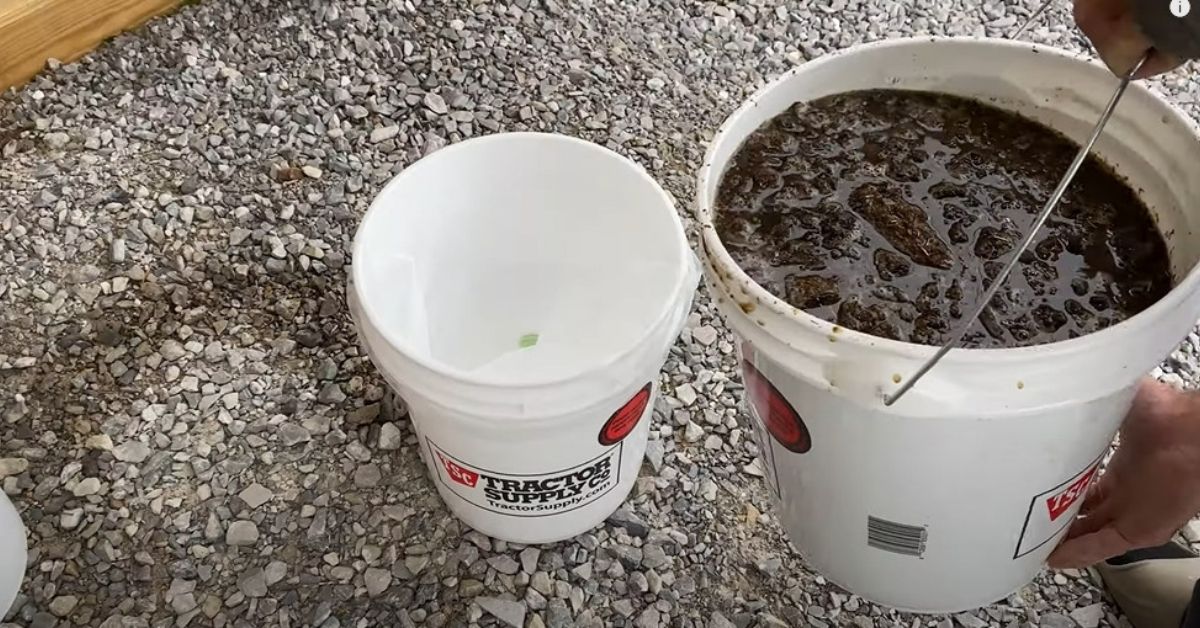
A manure tea fertilizer works as a foliar feed or you can just pour or spray the manure tea liquid on the soil where you grow the plants. It is very easy to use the manure tea fertilizer and you can use it again and again.
You can provide manure tea fertilizer for any kind of plant because this fertilizer will basically fertilizer the soil so that the plants grow well.
The manure tea should be strained very well before using. You can add the stained manure back to the bucket, add more dried manure and water. This will allow using the strained mature another use for more tea.
Using a mesh strainer really helps with this step in straining the manure tea. You won’t be able to use a spigot if the manure tea is not placed in the bag to steep, it will clog the spigot.
After using the manure one to two times, the used manure in the compost tumbler or even in the worm bin. Our worms love it.
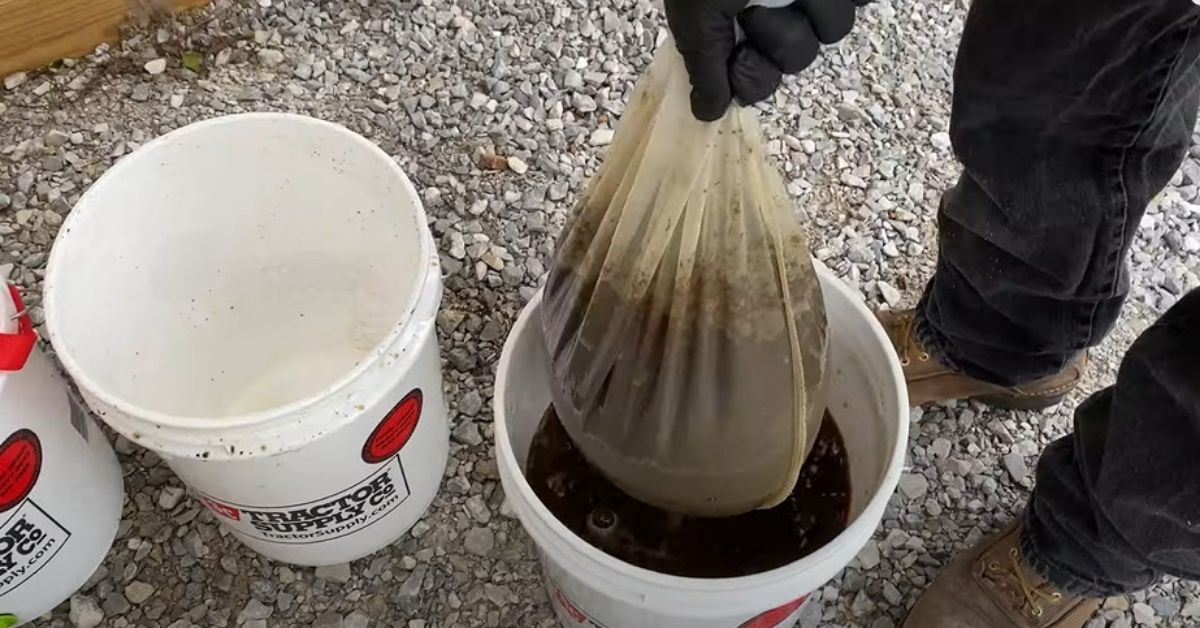
I only use the manure tea in my Hügelkultur Raised Beds, container gardening which you can find in my Guide to Container Gardening, Oya and Ollas, and the perimeter of the plants to deep water the roots and dilute the water in my water pipe garden with it.
How Often Should I Use Manure Tea?
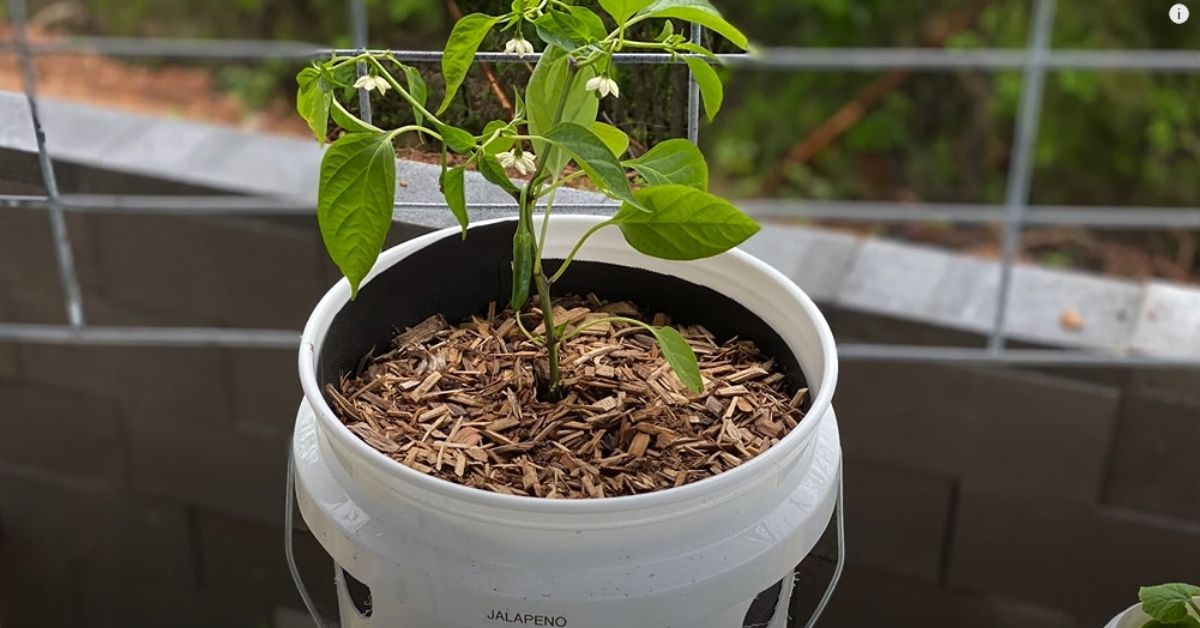
You should not use manure tea so often because it can burn your plants and increase too much nitrogen. So, it is important to understand the right time to use the manure tea.
Ideally, you can apply manure tea fertilizer every 15 to 30 days during the growing seasons. In general, you can use manure tea fertilizer every day, but don’t use it too much and make sure the manure was aged and diluted.
Aside from using manure tea fertilizer, I like to switch out between manure tea and my Fish Emulsion Fertilizer as well.
I prefer to feed my plants every single week a little rather than giving them a “SHOT” of a strong dose. Like taking a vitamin c each day versus taking several in one day, once a week.
Manure is rich in nitrogen and many other nutrients. I use more manure tea when I plant at the beginning for the early plant growth. It’s like giving the baby plants vitamins.
Is Manure Tea Fertilizer Good for Tomatoes?
You can fertilize any plants using manure tea in your garden because manure tea fertilizer contains enough nitrogen. Tomatoes will grow well when you use manure tea because tomatoes need nitrogen to grow.
Somehow, you should not add too much manure tea liquid so that it will grow effectively. Meanwhile, you should not fertilize some root crops like turnips, radishes, carrots, beets, and potatoes using manure tea because they need more potassium than nitrogen. The manure tea is good for healthy top growth while root growth is not good enough.
Should I Add Molasses to Manure Tea?
Unlike compost tea where molasses is added to “ferment” the compost, it is highly recommended NOT to add molasses or any kind of sugar to the manure, harmful organisms can be promoted to grow and that is not a good thing. Manure and water are all you need.
Water the plants well, add manure tea last. This is my preference; you may choose to add the tea and then water the plants.
In Conclusion
In summary, that’s all about manure tea fertilizer recipe for gardening that you can make from a cow. Basically, the main ingredient of this manure tea is cow manure and water.
You can put some water in a container and just put the cow manure in the container. Let the manure settles down so you can take the manure tea liquid only.
Meanwhile, the use of organic manure tea is also quite easy because you can just pour the manure tea on the soil or just spray the liquid. It is also good for tomatoes growth and other kinds of plants.
However, this manure tea is not good for root crops like potatoes, carrots, and much more, at least we don’t use it for them.
Interested in more gardening tips and tricks? Visit 12 Gardening Tips for Beginners to learn the basics needed to plant your own garden! Interested in starting your own garden, but have no space? Check out Vertical Gardens for Small Spaces!
Want to learn how to make your own natural soil for your new garden? Check out Making Compost Naturally into Gardening Soil.
Need some ideas on what to grow this year in your garden? Check out 11 Great Plants to Regrow From Cuttings!
Have you ever thought about using manure tea to benefit your plants? Wiki can tell you the benefits of using Manure to help your plants in their growing process!
Please subscribe:
Thank you for stopping by and reading our blog. If you haven’t signed up for our newsletter, please take a moment and do so. We will not sell, share, or use your contact information. We are also ad-free and will not inundate you with unnecessary emails. Click the button below to join our community and receive our newsletter.
Please see the footer for FBC Disclaimer, Privacy Policy, Terms and Conditions.
PIN IT:

Pingback: Easy Container Gardening Tips For Beginners ⋆ Farmhouse-bc
Pingback: Fish Emulsion Fertilizer, How To Make And Use! ⋆ Farmhouse-bc
Pingback: Attract More Butterflies In 10 Easy Tips! ⋆ Farmhouse-bc
Pingback: Vertical Gardens For Small Spaces ⋆ Farmhouse-bc
Pingback: Knowing The Difference Between Vermiculite And Perlite?
Pingback: Elderberry Vs Pokeberry-the Shocking Difference Of The 2! ⋆ Farmhouse-bc
Pingback: Hanging Flower Basket ⋆ Farmhouse-bc
Pingback: Oyas And Ollas Made Easy For Your Garden ⋆ Farmhouse-bc
Pingback: Seed Organization In 6 Amazingly Simple Ways ⋆ Farmhouse-bc
Pingback: 5 Shocking Reasons To Buy Dollar Tree Seeds ⋆ Farmhouse-bc
Pingback: Growing Millet Easily For Birds ⋆ Farmhouse-bc
Pingback: Hügelkultur Raised Beds ⋆ Farmhouse-bc